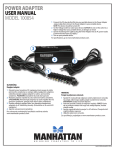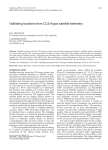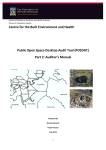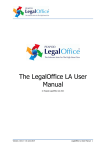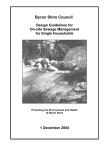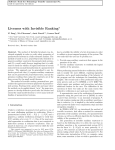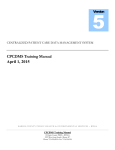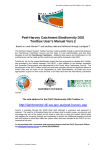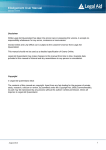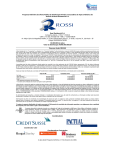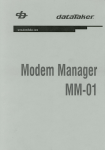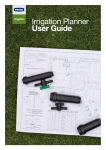Download Information Sheet: About your safety
Transcript
About your safety This is a guide to help prompt ideas and action if you are at risk of family and domestic violence. It does not replace legal advice. If your safety is at risk, you should take precautions for your safety, the safety of your children and get legal advice. The ideas set out in this guide are based on real life examples from people who have needed to take such steps in relation to their safety. o Medicare card Keep this information sheet in a safe place At the end of this guide is a list of agencies and community services that offer support to people at risk of family and domestic violence. Some of these agencies and services may be able to help you in an emergency situation. There is also a space for you to write down additional emergency telephone numbers that you or your children may need to find quickly. Please take the time to think about what telephone numbers you need to include. Be prepared – safety planning You may not be ready or able to leave the relationship right now. However, you can prepare a safety plan for you and your children to use when you notice tension building up, you are worried there may be an incident of violence against you about to occur, or when an incident of violence does occur. Safety planning – be ready to leave at a moments notice. Make sure you have all your and your children’s important documents together (or copies of them if they will be missed) and keep them in a safe place outside the home so you do not have to gather them together in an emergency. These include: o all forms of identification o your driver’s licence About your safety Last reviewed: 30/01/2014 o passports o birth certificates o bank account details o bills o car registration o contracts Make copies of photographs, children’s reports and certificates Write down the name of any medication you or your children need Remove any personal items (heirlooms, gifts) that you do not want to leave behind Keep some spare clothing for you and the children with a friend or neighbour Save a little money each week and keep it with your documents Make yourself aware of the names of any community services you may need to contact in an emergency. Write the name and telephone number of these services in the space provided at the end of this document Speak to a domestic violence counsellor to review your safety plan Keep a copy of this guide with your documents so you have all your information (telephone numbers and documents) in one place If you have pets and are concerned for their safety you can contact the Patricia Giles Centre Safe Families, Safe Pets on (08) 9300 0340 398649v9 Page 1 of 13 Online Safety - staying safe using your phone, computer and social media sites Online safety is a very real concern for people at risk of family and domestic violence because it is so easy to track and monitor online activities through computer browser history and social media communications. Below are some tips about keeping yourself safe if you are preparing to leave an abusive relationship and are using a computer, tablet or mobile phone to source information to assist you to leave. There are also some tips to help you remain safe when using electronic and social media devices after you leave. After you have finished browsing, clear you recent search history on the computer. There is a list of instuctions about how to do this at the back of this document Before you log off, make some random website searches such as visiting some online shopping sites, researching hobbies or movies. This will leave a “safe” recent browser history trail Always make sure you completely log off the computer after you have finished Ask your friends not to post any photos of you or make comments about you on their social media pages Be cautious when you get a request for friends through social media sites Educating children to be careful about what they post on social media sites such as Facebook, Twitter, Instagram, Flickr GoogleMap, Snapchat and others programs is important. Do not include details that could identify your location such as comments about work, school, the vet you take your pets to, bargains you find at your local shopping centre Use the GPS or location function on your smart phone or tablet cautiously when uploading photos or location details to social media sites as it can be used to pinpoint where you are or tag the location of the photo. Turn off the location and GPS functions on your iphone. o Settings menu o the privacy menu o turn on locations Turn off the smartphone locations Use a library or friends computer to seach for information to assist you to leave o services app o location services Have a private email account that you can access from a safe computer outside of your home and use this address to receive information to assist you to leave the abusive relationship o privacy off o You can also store some of your important information in emails to yourself from your private email address o You can attach a copy of this information sheet and send it to yourself from your private email address Change your password regularly Check your privacy settings on social media sites. Information you post on your site may appear on your friends social media pages and therefore accessible by their friends About your safety Last reviewed: 30/01/2014 settings on a What can I do to protect my children? Get legal advice. Legal Aid WA’s Domestic Violence Legal Unit, (DVLU) staff provides legal advice and assistance to women about domestic violence issues. The services include counselling, safety planning, liaising with police, legal advice and a duty lawyer service for interim restraining orders. Staff also provide representation at court for restraining orders (where legal aid has been granted). Please contact the Legal Aid WA InfoLine on 1300 650 579 for more information. Talk to your children about what to do if your (ex) partner becomes abusive. Your children need to be able to get out of the house and go somewhere safe. Practice, with your children, getting out of the house safely (what are the best exits) 398649v9 Page 2 of 13 Arrange for your children to have a safe place to go (eg a neighbour’s house). Tell your children where they can go if there is an emergency Teach your children how to use the phone and how to call the police in an emergency Talk to your children about how Crisis Care can help with refuge accommodation and transport to get to a refuge. Make sure they know where the telephone number is Make sure your children know your address and phone number to give to the police or the Crisis Care operator when they call You may wish to hide a mobile phone for them to use or show them where the closest phone box is and practice with them how to dial the emergency numbers Teach your children to stay safe when using internet, mobile phones, social networking sites and other forms of technology Talk to your children’s day care manager and school principal about who has permission to collect the children. Follow this up in writing. Legal Aid WA can assist you to draft a letter to the day-care or school Talk to your children about what they should do if your ex partner attends their school (i.e. do not go with your ex-partner. Go to the principal’s office or find a teacher for help). If your ex partner has threatened you or your children and has firearms or weapons, make sure you and your children are safe then report the threat to the police. Get legal advice. Communication services safety check list Making sure you can get information you need sent to you safely. Do you have a postal address that is safe for agencies like Legal Aid WA, Centrelink etc to send information to? NO o talk to a friend or family member you trust whose address you can use and who will keep your mail safe o set up a PO Box in a suburb that is not near to the suburb you live in. About your safety Last reviewed: 30/01/2014 YES o if your postal address is different from your home address make sure you always give out your postal address. Phone Do you have a phone number that is safe for agencies to contact you on? NO o if it is not safe for agencies to leave a message DO NOT give out the number o if you need to give out your number, tell the person you are giving the number to what to do if someone other than you answers the phone YES – please be aware that: o Anyone who has access to your telephone can find out who you last called by pressing the redial button on your phone. If you call a service for legal advice, referrals or other assistance, do the following when you hang up o dial a safe number (eg work or children’s school) so that this will be the last number you used o delete the record of the last number you used by dialling 1223 (Directory Assistance) after you have completed the call o be aware that some telephone handsets store and display all numbers you have called. Please review the user manual for instructions about how to clear any numbers you do not want to be recorded or use a family member’s telephone to make these calls If you move house, you can: change your phone numbers request a silent number by contacting your phone provider. This means that your telephone number is not listed in the phone book or Internet get an answering machine so that you can screen your calls When you move to a new address or get a new phone number, only give it out to people you trust will not pass it on to your ex partner if pressured. 398649v9 Page 3 of 13 What should I do if I am abused or threatened? If there is an incident (eg you are verbally or physically abused or threatened): contact the police get medical attention contact Crisis Care – This is a 24 hours service. They are able to tell you which refuges have vacancies and they can help you get to a refuge. The number for Crisis Care is (08) 9223 1111 or1800 199 008 (Freecall) and is also included in the telephone list at the back of this document get legal advice about a violence restraining order (VRO) keep a diary and write down the date, time and details of what happened keep your diary in a safe place with a friend or family member you trust. Where can I get financial assistance? The following agencies may be able to offer you emergency financial assistance if you leave your home in a hurry and you do not have access to money for food or housing. Centrelink may provide emergency financial assistance to people who have recently left a domestic violence relationship. Types of payments available are: o crisis payment – this is a one off emergency payment available during the first 7 days of separation o on going financial support including parenting payments, family tax benefit and rent assistance o Centrelink may also assist with food vouchers, emergency relief and referrals o Department of Housing (Homeswest) may help with bond assistance. After you leave Seek legal advice as soon as possible after you leave a family violence relationship, especially if: there is a restraining order the court has imposed protective conditions on your ex partner. bail How can I make my home secure? Being safe in your home is important for you and your children. The following suggestions may help you feel secure for you and your children. ask a friend or family member to stay with you for a few days you and your children stay with a friend or family member for a few days make sure your doors, windows, gates, garage, and any roof access are able to be locked if you are renting privately, you may want to move to a new ,confidential, address (get legal advice before you break a lease) if you rent through the Department of Housing, you can speak with a Housing Services Officer at your local office to discuss safety issues if you have a mortgage, get legal advice about protecting your assets and changing the locks. Legal Aid WA has a range of information about family separation and domestic violence on the website at www.legalaid.wa.gov.au/when separating and on VROs on the website www.legalaid.wa.gov.au under Information about the law. Safe at home service If you have VRO in place, you will be eligible for financial assistance to change your locks and make your home safer for you and your children. The Safe at Home staff may use their discretion to assist applicants without a VRO in place. For more information call the Safe at Home Service in your area. North West Metropolitan Area (Joondalup) Patricia Giles Centre Inc Phone: (08) 9562 4453 Email: [email protected] you have children About your safety Last reviewed: 30/01/2014 398649v9 Page 4 of 13 North East Metropolitan Area (Nollamara) Stirling Women’s Centre Phone: (08) 9205 7387 Email: [email protected] information. Some information can be given out by mistake. South East Metropolitan Area (Highgate) Ruah Phone: (08) 9227 0348 Email: [email protected] South West Metropolitan Area (Rockingham) Lucy Saw Centre Phone: (08) 9527 3289 Email: [email protected] South West (Bunbury) South West Refuge Inc Phone: (08) 9791 2894 or 0488 094 798 Email: [email protected] Wheatbelt (Northam) Share & Care Community Services Group Inc. Phone: (08) 9622 8731 or 0400 237 039 After you leave If you leave home and move to another address, you will need to change your contact details with the following: Post Office (mail redirection) your bank your employer the children’s school Department of Transport (drivers licence) your telephone provider – ask for a silent line When you contact Telstra, ask for a Silent Line. Your name, address or telephone number will not be listed in any White Pages telephone directory or electronic White Pages search. Your telephone number will not be disclosed through Directory Assistance. Telstra will waive the fee for people experiencing domestic and family violence. When you contact any agency or service to change your contact details, tell the person you speak to that your new address and phone number must remain confidential. Ask for a Privacy Alert to be placed on your records. This is a warning notice that will come up on the computer screen when your records are accessed by an employee at any of the above services, drawing their attention to the fact that your details must remain confidential. Make a note in your diary of the agencies and services you requested a Privacy Alert to be placed on your file. Australian Electoral Roll The Australian Electoral Commission is a Commonwealth government department that maintains the Australian and West Australian electoral roll. The name and address of every person registered to vote in Australia appears on the electoral roll and this information is available to the public. You can apply to the Australian Electoral Commission to register as a silent elector if you fear that publication of your address on the electoral roll would put the safety of you or your family at risk. This means that your details are not publicly available. Please contact the Australian Electoral Commission on 13 23 26 for more information about registering as a silent elector. Synergy Landgate Water Corporation Landgate is a State government department that maintains the Western Australia official register of land ownership. If you purchase any property or your name appears on a land title in Western Australian, your name and address appears on the official register of land ownership and is available to the public. If your personal safety or your family’s safety is deemed at risk you can apply to Landgate for your address details to be suppressed. This means that your details are not publicly available. For more information about this service, contact Landgate on (08) 9273 7373. Alinta Gas Centrelink Australian Electoral electoral roll) Commission (the Landgate Be very careful about giving out your new contact details. Your contact details may appear on public records, which means anyone can access your About your safety Last reviewed: 30/01/2014 398649v9 Page 5 of 13 Staying safe at work You may feel your workplace is where you feel safe, a place where you can keep what is happening at home private. However, sometimes what is happening at home has a direct impact on your work. Some examples of this could include: being prevented from getting to work on time, receiving excessive text messages, phone calls or emails threatening behaviour such as the abusive person making threats to tell your colleagues or boss embarrassing information being followed to and from work. This behaviour could result in you being distressed or crying at work and struggling to manage your workload and deadlines. The Safe at Home, Safe at Work toolkit has a range of information to help you to stay safe at work. It includes information about how to approach managers, confidentiality, organising temporary safety measures and negotiating time off to attend meetings or court hearings. The Safe at Home, Safe at Work toolkit, can be downloaded from http://www.dvandwork.unsw.edu.au/whatyou-need-know. Family Violence Prevention Services, Aboriginal Family Law Service and Djinda Services contact details The Family Violence Prevention Legal Service (FVPLS) and Aboriginal Family Law Services (AFLS) are legal and counselling services for victims of family violence and/or sexual assault who are Aboriginal or Torres Strait Islander peoples, or whose partner or children are Aboriginal or Torres Strait Island peoples. Each FVPLS or AFLS provides a range of services that may include legal advice and information, court representation for family violence and sexual assault matters and sexual abuse counselling. The following is a list of contact details for these services. Family Violence Prevention Legal Service Boyd House 45-47 Aberdeen Street ALBANY WA 6332 Phone: (08) 9842 7777 Fax: (08) 9842 6851 Marninwarntikura Family Violence Prevention Unit Balinijangarri Road FITZROY CROSSING WA 6765 Phone: (08) 9191 5284 Fax: (08) 9191 5611 Aboriginal Family Law Services Unit 1/46 Dampier Terrace BROOME WA 6725 Phone: (08) 9193 5455 Fax: (08) 9193 7913 Aboriginal Family Law Services 13 Skipworth Street CARNARVON WA 6701 Phone: (08) 9941 3633 Fax: (08) 9941 3801 Aboriginal Family Law Services 66 Fitzgerald Street GERALDTON WA 6530 Phone: (08) 9965 4654 Fax: (08) 9921 6377 Aboriginal Family Law Services 2/45 Brookman Street KALGOORLIE WA 6430 Phone: (08) 9021 0244 Fax: (08) 9021 2765 Aboriginal Family Law Services Suite 1/10 Banksia Street KUNUNURRA WA 6743 Phone: (08) 9168 2001 Fax: (08) 9169 3321 Aboriginal Family Law Services Unit 5/31 Throssell Road SOUTH HEDLAND WA 6722 Phone: (08) 9172 5024 Fax: (08) 9172 5035 Djinda Services 21 Southport Street WEST LEEDERVILLE WA 6007 Phone: 9489 6391 Email: [email protected] About your safety Last reviewed: 30/01/2014 398649v9 Page 6 of 13 Pat Giles Centre contacts Patricia Giles Centre, Women’s Counselling Service Crisis and short term counselling is offered via the telephone and also face to face. To see a counsellor, phone and make an appointment to come into the centre. Patricia Giles Centre, Children's Counselling Service Helping children, adolescents and their families who have experienced domestic and family violence. This service provides free short term (8-12) counselling sessions for children aged 4 to 18 About your safety Last reviewed: 30/01/2014 years who have experienced family and domestic violence. Counselling is only available after parents have separated and children are living with the non-abusing parent. The service is open from 9 am to 5 pm on weekdays. You may have to leave a message with your contact details, if all counsellors are busy. Patricia Giles Centre, Safe Families Safe Pets Program Safe Pets program coordinates temporary arrangements for families who are going into women’s refuge and need to make arrangements for their pets to be cared for. Currently, this service is only available in the Perth metropolitan area. 398649v9 Page 7 of 13 Important telephone numbers Name Details Phone Number Police, Ambulance and Fire Emergency Numbers 000 Available 24 hours a day, 131 444 (calls to this seven days a week. number are recorded.) Centrelink 9.00 am – 5.00 pm Provides financial assistance to people in Monday to Friday need Crisis Care Provides information about metropolitan and regional refuge vacancies and may be able to organise a taxi to take you and your children to the refuge. 132 850 1800 810 586 (Freecall) Available 24 hours a day, (08) 9223 1111 seven days a week 1800 199 008 (Freecall) Crisis Care can help provide telephone counselling about domestic violence issues. Department of Housing (Homeswest). Domestic Violence Advocacy Support Central (DVAS) 8.00 am – 5.00 pm (08) 9222 4666 Monday to Friday 1800 093 325 (Freecall) 9.00 am – 5.00 pm (08) 9227 5852 Monday to Friday (08) 9328 5427 (fax) Email: [email protected] Domestic Violence Legal Unit, Legal 8.30am – 4:30.pm Aid WA (DVLU) provides legal advice, Monday to Friday duty law and legal assistance service to women in relation to violence retraining orders. Please contact the Legal Aid WA InfoLine for more information. 1300 650 579 Legal Aid WA’s InfoLine 1300 650 579 8.30am – 4.30 pm Monday to Friday Patricia Giles Centre, Children's Counselling Service Weekdays 9.00am to 5.00pm (08) 9328 1888 Patricia Giles Centre, Women’s Counselling Service Weekdays 9.00am to 4.00pm (08) 9300 1022 Patricia Giles Centre 9.00.am – 4:00.pm (08) 9300 0340 Safe Families Safe Pets Program Monday to Friday About your safety Last reviewed: 30/01/2014 398649v9 Page 8 of 13 Name Details Sexual Assault Resource Centre Available 24 hours a day, (08) 9340 1828 seven days a week 1800 199 888 (Freecall) Telstra Silent Line Service Women’s Council for Domestic & Family Violence Services (WA) Phone Number 132 200 9:00 am – 4:30pm (08) 9420 7264 Monday to Friday (08) 9486 8744 Email: [email protected] Women’s Domestic Violence Helpline can help provide telephone counselling about domestic violence issues Available 24 hours a day, (08) 9223 1188 seven days a week 1800 007 339 (Freecall) Victim Support Service 8.30am – 4:30.pm (08) 9425 2850 Includes support at Magistrates Courts through Family Violence Services at Perth, Armadale, Joondalup, Fremantle, Rockingham, Midland & regional locations Monday to Friday 1800 818 988 (Freecall) About your safety Last reviewed: 30/01/2014 398649v9 Page 9 of 13 Your important telephone numbers Name About your safety Last reviewed: 30/01/2014 Details Phone Number 398649v9 Page 10 of 13 Safety planning – Online safety for you and your family Below is a guide to clearing your browsing history and your computer’s cache (temporary file storage) from your computer. We have included some of the common browsers. Remember to look up some safe sites such as online shopping, movie sites or hobbies after you have cleared your search history so you will not cause suspicion if your computer is checked. Select Temporary Internet files, Cookies, and History. Select Delete. Internet Explorer 7 On the menu bar at the top of the document, open Tools menu Select Internet Options. Select Browsing history Select Delete On the menu bar at the top of the document, open Tools menu To delete your cache, select Delete files. Select Options To delete your cookies, select Delete cookies Select Under the Hood tab To delete your history, select Delete history. Select Clear browsing data Close, and then OK to exit. Select the items you want to clear (e.g., Clear browsing history, Clear download history, Empty the cache, Delete cookies and other site data). You can choose the period of time for which you want to clear cached information from the Clear data from this period drop-down menu. To clear your Everything. entire cache, select Click Clear browsing data Windows Clearing Cookies in Internet Explorer Double Click on Internet Explorer icon Select Tools Select Internet Options Select General Tab Select the ‘Delete' button o untick "Preserve Favourites Website" data o select tick "Temporary Internet Files", "Cookies", "History" and "Form" data. Select the Delete Button; Once it has finished, be sure to close all open boxes Internet Explorer 8 Mac OS X On the menu bar at the top of the document open the Safety menu Select Delete Browsing History. Untick Preserve Favorites website data About your safety Last reviewed: 30/01/2014 Safari On the menu bar at the top of the document open the Safari tab. 398649v9 Page 11 of 13 Select the items you want to reset and then click Reset. Mobile Safari To clear cache and cookies: From the home screen, tap Settings Tap Safari At the bottom of Safari's settings screen, tap the buttons for Clear Cookies and Clear Cache. To confirm, tap Clear Cookies or Clear Cache again To clear history: o Cookies o Cache o Authenticated Season o Browser History o Saved Form o Search History o Select Clear Private Data Now o Close tabs Firefox 3.5 1. On the menu bar at the top of the document, open Tools menu 2. Select Clear Recent History. From the home screen, tap Safari 3. Select the Time range drop-down menu At the bottom of the screen, tap the Bookmarks icon 4. Select the range you want to clear In the lower left, tap Clear Tap Clear History. Clearing Cookies in FireFox 5. Select Everything to clear your entire cache or 6. Select the down arrow next to "Details" to delete individual sites to clear 7. Select Clear Now. Firefox 3 Double click the Firefox icon On the menu bar at the top of the document, open Tools menu Select the Privacy Tab Select Clear Now On the menu bar at the top of the document, open Tools menu Select Clear Private Data Select the searches you want to clear(e.g., Browsing history, Cache, Cookies) Select Clear Private Data Now Select the items you would like to clear About your safety Last reviewed: 30/01/2014 398649v9 Page 12 of 13 Legal Aid WA Offices TELEPHONE INFOLINE: 1300 650 579 (General Enquiries) InfoLine open Monday to Friday 8.30 am to 4.30 pm (Australian Western Standard Time) except public holidays Translating and Interpreting Service 131 450 National Relay Service (for hearing and speech impaired) 133 677 www.legalaid.wa.gov.au Perth Office 32 St Georges Terrace, Perth, WA 6000 1300 650 579 (08) 9261 6222 Southwest Regional Office 7th Floor, Bunbury Tower, 61 Victoria Street, Bunbury, WA 6230 (08) 9721 2277 Great Southern Regional Office Unit 3, 43-47 Duke Street, Albany, WA 6330 (08) 9892 9700 Goldfields Regional Office Suite 3, 120 Egan Street, Kalgoorlie, WA 6430 (08) 9025 1300 Midwest & Gascoyne Regional Office Unit 7, The Boardwalk, 273 Foreshore Drive, Geraldton, WA 6530 (08) 9921 0200 Pilbara Regional Office 28 Throssell Road, South Hedland, WA 6722 (08) 9172 3733 West Kimberley Regional Office Upper Level, Woody’s Arcade, 15-17 Dampier Terrace, Broome, WA 6725 (08) 9195 5888 East Kimberley Regional Office 98 Konkerberry Drive, Kununurra, WA 6743 (08) 9166 5800 Indian Ocean Office Administration Building, 20 Jalan Pantai Christmas Island, Indian Ocean, WA 6798 (08) 9164 7529 This information contains a summary of the law and is correct at the date of publication. It is not legal advice. You should always seek legal advice about your individual situation. Any services referred to which are not operated by Legal Aid Western Australia are not endorsed or approved by Legal Aid Western Australia. ©Legal Aid Western Australia This information sheet may be copied, reproduced or adapted to meet local needs by community based organisations without permission from Legal Aid Western Australia provided the copies are distributed free or at cost (not for profit) and the source is fully acknowledged. For any reproduction with commercial ends, or by Government departments, permission must first be obtained from Legal Aid Western Australia. About your safety Last reviewed: 30/01/2014 398649v9 Page 13 of 13













